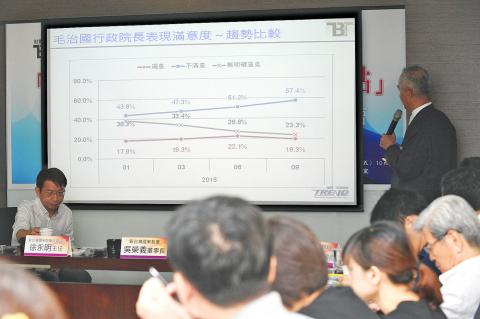President Ma Ying-jeou’s (馬英九) and Premier Mao Chih-kuo’s (毛治國) approval ratings remained low at 21.9 percent and 19.3 percent respectively, according to the newest poll by the Taiwan Brain Trust think tank.
In direct correlation to their low popularity, dissatisfaction with Ma and Mao stood at 69.9 percent and 57.4 percent respectively, the survey released yesterday showed.
The widespread public dissatisfaction with the Ma administration was also reflected in their dissatisfaction with the Chinese Nationalist Party (KMT), which stood at 71.8 percent.

Photo: Chen Chih-chu, Taipei Times
The Democratic Progressive Party (DPP) garnered a more favorable 42.3 percent satisfaction rating, but 45 percent also said they were dissatisfied with the party’s performance.
The poll found that 54.5 percent of respondents were confident about the DPP’s ability to maintain peaceful development of cross-strait relations should it win the presidential election next year, while 36 percent were unconvinced.
Asked whom they would support in the Jan. 16 presidential election if the candidates remained Tsai Ing-wen (蔡英文) of the DPP, Hung Hsiu-chu (洪秀柱) of the KMT and James Soong (宋楚瑜) of the People First Party, 46.8 percent of respondents chose Tsai, 17.2 percent picked Hung and 16.7 percent favored Soong.
Support for Soong dropped from 23.6 percent in July, when he ranked second.
Taiwan Brain Trust’s poll center director Hsu Yung-ming (徐永明) said the party’s decision to send PFP Secretary-General Chin Chin-sheng (秦金生) to attend the Chinese military parade in Beijing on Sept. 3 hurt support for Soong.
The decision also hurt the PFP’s legislator election standings, with the poll showing PFP party votes standing at 5.6 percent, trailing behind the New Power Party’s 6.8 percent.
When asked about their perceptions of former vice president Lien Chan’s (連戰) participation in the military parade, 52.1 percent of respondents said Lien’s participation had a negative effect on cross-strait relations, while 29.2 percent felt it had a positive contribution.
The poll showed that 54. 6 percent of respondents felt that the event in itself had a negative effect on the peaceful development of cross-strait relations, while 20.8 percent felt it had a positive effect.
It also found that 44.4 percent of respondents thought China to be the nation with the most influence on Taiwan’s presidential election, while 39.2 percent and 2.9 percent felt that the US and Japan respectively were the most influential.
If China were to vocally support a particular candidate, 85.6 percent of respondents said they would not support that candidate, while 6.3 percent said they would.
On economic issues, 64.2 percent said economic development is the primary issue in next year’s presidential election, followed by government effectiveness at 12.7 percent. Only 4.5 percent of polled individuals felt that cross-strait policies should be prioritized.
The poll found that 41.1 percent of respondents felt that Tsai was the most qualified to handle Taiwan’s economic problems, with Soong coming in second at 24.5 percent. Hung trailed at 9.8 percent.
The survey, conducted from Saturday last week to Monday, with 1,070 valid samples, has a margin of error of 3 percentage points.

Taiwan is to commence mass production of the Tien Kung (天弓, “Sky Bow”) III, IV and V missiles by the second quarter of this year if the legislature approves the government’s NT$1.25 trillion (US$39.78 billion) special defense budget, an official said yesterday. Commenting on condition of anonymity, a defense official with knowledge of the matter said that the advanced systems are expected to provide crucial capabilities against ballistic and cruise missiles for the proposed “T-Dome,” an advanced, multi-layered air defense network. The Tien Kung III is an air defense missile with a maximum interception altitude of 35km. The Tien Kung IV and V

The disruption of 941 flights in and out of Taiwan due to China’s large-scale military exercises was no accident, but rather the result of a “quasi-blockade” used to simulate creating the air and sea routes needed for an amphibious landing, a military expert said. The disruptions occurred on Tuesday and lasted about 10 hours as China conducted live-fire drills in the Taiwan Strait. The Civil Aviation Administration (CAA) said the exercises affected 857 international flights and 84 domestic flights, affecting more than 100,000 travelers. Su Tzu-yun (蘇紫雲), a research fellow at the government-sponsored Institute for National Defense and Security Research, said the air

Taiwan lacks effective and cost-efficient armaments to intercept rockets, making the planned “T-Dome” interception system necessary, two experts said on Tuesday. The concerns were raised after China’s military fired two waves of rockets during live-fire drills around Taiwan on Tuesday, part of two-day exercises code-named “Justice Mission 2025.” The first wave involved 17 rockets launched at 9am from Pingtan in China’s Fujian Province, according to Lieutenant General Hsieh Jih-sheng (謝日升) of the Office of the Deputy Chief of the General Staff for Intelligence at the Ministry of National Defense. Those rockets landed 70 nautical miles (129.6km) northeast of Keelung without flying over Taiwan,

A strong continental cold air mass is to bring pollutants to Taiwan from tomorrow, the Ministry of Environment said today, as it issued an “orange” air quality alert for most of the country. All of Taiwan except for Hualien and Taitung counties is to be under an “orange” air quality alert tomorrow, indicating air quality that is unhealthy for sensitive groups. In China, areas from Shandong to Shanghai have been enveloped in haze since Saturday, the ministry said in a news release. Yesterday, hourly concentrations of PM2.5 in these areas ranged from 65 to 160 micrograms per cubic meter (mg/m³), and pollutants were